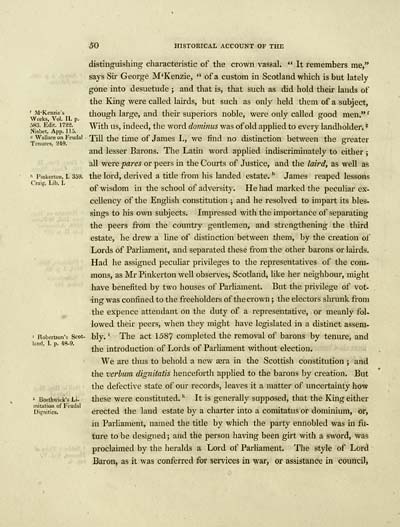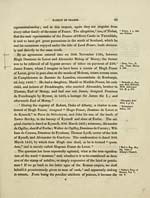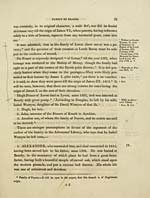Download files
Complete book:
Individual page:
Thumbnail gallery: Grid view | List view

50
HISTORICAL ACCOUNT OF THE
' M'Kenzie's
Works, Vol. II. p.
583. Edit. 1722.
Nisbet, App. 115.
« Wallace on Feudal
Tenures, 249.
i> Pinkerton, I. 359.
Craig. Lib. I.
' Robertson's Scot-
land, I. p. 48-9.
'^ Borthvvick's Li-
mitation of Feudal
Dignities.
distinguishing characteristic of the crown vassal. «' It remembers me,"
says Sir George M'Kenzie, " of a custom in Scotland which is but lately
gone into desuetude ; and that is, that such as did hold their lands of
the King were called lairds, but such as only held them of a subject,
though large, and theu- superiors noble, were only called good men," '
With us, indeed, the word dominus was of old applied to every landholder. ^
Till the time of James I., we find no distinction between the greater
and lesser Barons. The Latin word appHed indiscriminately to either ;
all were pares or peers in the Courts of Justice, and the laird, as well as
the lord, derived a title from his landed estate. *" James reaped lessons
of wisdom in the school of adversity. He had marked the peculiar ex-
cellency of the Enghsh constitution ; and he resolved to impart its bles-
sings to his own subjects. Impressed with the importance of separating
the peers from the countiy gentlemen, and strengthening the third
estate, he di'ew a line of distinction between them, by the creation oi'
Lords of Parliament, and separated these from the other barons or lairds.
Had he assigned peculiar privileges to the representatives of the com-
mons, as Mr Pinkerton well observes, Scotland, like her neighbour, might
have benefited by two houses of ParUament. But the privilege of vot-
ing was confined to the freeholders of the crown ; the electors shrunk from
the expence attendant on the duty of a representative, or meanly fol-
lowed their peers, when they might have legislated in a cUstinct assem-
bly. ' The act 1587 completed tlie removal of barons by tenure, and
the introduction of Lords of Parliament without election.
We are thus to behold a new aera in the Scottish constitution ; and
the verbum dignitatis henceforth applied to the barons by creation. But
tlie defective state of our records, leaves it a matter of uncertainty how
these were constituted. " It is generally supposed, that the King either
erected the land estate by a charter into a comitatus or dominium, or,
in Parliament, named the title by which the party ennobled was m fu-
ture to be designed; and the person having been girt with a sword, was
proclaimed by the heralds a Lord of ParUament. The style of Lord
Baron, as it was conferred for services in war, or assistance in council,
HISTORICAL ACCOUNT OF THE
' M'Kenzie's
Works, Vol. II. p.
583. Edit. 1722.
Nisbet, App. 115.
« Wallace on Feudal
Tenures, 249.
i> Pinkerton, I. 359.
Craig. Lib. I.
' Robertson's Scot-
land, I. p. 48-9.
'^ Borthvvick's Li-
mitation of Feudal
Dignities.
distinguishing characteristic of the crown vassal. «' It remembers me,"
says Sir George M'Kenzie, " of a custom in Scotland which is but lately
gone into desuetude ; and that is, that such as did hold their lands of
the King were called lairds, but such as only held them of a subject,
though large, and theu- superiors noble, were only called good men," '
With us, indeed, the word dominus was of old applied to every landholder. ^
Till the time of James I., we find no distinction between the greater
and lesser Barons. The Latin word appHed indiscriminately to either ;
all were pares or peers in the Courts of Justice, and the laird, as well as
the lord, derived a title from his landed estate. *" James reaped lessons
of wisdom in the school of adversity. He had marked the peculiar ex-
cellency of the Enghsh constitution ; and he resolved to impart its bles-
sings to his own subjects. Impressed with the importance of separating
the peers from the countiy gentlemen, and strengthening the third
estate, he di'ew a line of distinction between them, by the creation oi'
Lords of Parliament, and separated these from the other barons or lairds.
Had he assigned peculiar privileges to the representatives of the com-
mons, as Mr Pinkerton well observes, Scotland, like her neighbour, might
have benefited by two houses of ParUament. But the privilege of vot-
ing was confined to the freeholders of the crown ; the electors shrunk from
the expence attendant on the duty of a representative, or meanly fol-
lowed their peers, when they might have legislated in a cUstinct assem-
bly. ' The act 1587 completed tlie removal of barons by tenure, and
the introduction of Lords of Parliament without election.
We are thus to behold a new aera in the Scottish constitution ; and
the verbum dignitatis henceforth applied to the barons by creation. But
tlie defective state of our records, leaves it a matter of uncertainty how
these were constituted. " It is generally supposed, that the King either
erected the land estate by a charter into a comitatus or dominium, or,
in Parliament, named the title by which the party ennobled was m fu-
ture to be designed; and the person having been girt with a sword, was
proclaimed by the heralds a Lord of ParUament. The style of Lord
Baron, as it was conferred for services in war, or assistance in council,
Set display mode to:
![]() Universal Viewer |
Universal Viewer | ![]() Mirador |
Large image | Transcription
Mirador |
Large image | Transcription
Images and transcriptions on this page, including medium image downloads, may be used under the Creative Commons Attribution 4.0 International Licence unless otherwise stated. ![]()
| Histories of Scottish families > Historical account of the family of Frisel or Fraser, particularly Fraser of Lovat > (68) Page 50 |
|---|
| Permanent URL | https://digital.nls.uk/94946482 |
|---|
| Description | A selection of almost 400 printed items relating to the history of Scottish families, mostly dating from the 19th and early 20th centuries. Includes memoirs, genealogies and clan histories, with a few produced by emigrant families. The earliest family history goes back to AD 916. |
|---|

